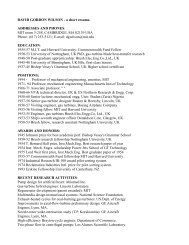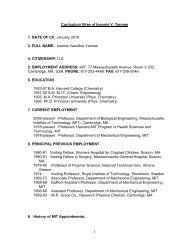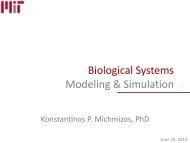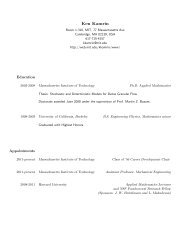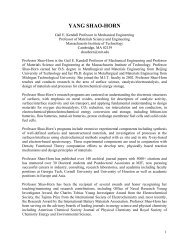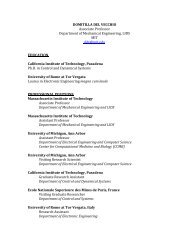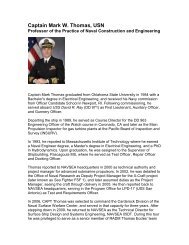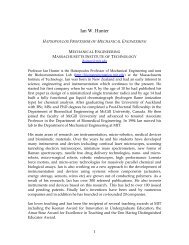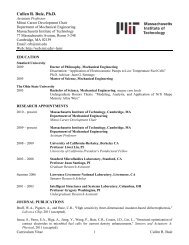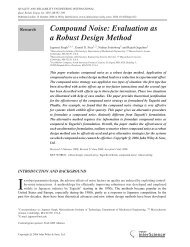Guide To Graduate Study In Mechanical Engineering - MIT
Guide To Graduate Study In Mechanical Engineering - MIT
Guide To Graduate Study In Mechanical Engineering - MIT
Create successful ePaper yourself
Turn your PDF publications into a flip-book with our unique Google optimized e-Paper software.
A small fraction of the incoming students - those judged by the Department to be the best<br />
prospects - receive guaranteed offers of assistantships shortly after being accepted. This means<br />
simply that the Department guarantees that they will receive a full RA or TA for their first<br />
academic year. Note, however, that each of these students still has to accept a particular position<br />
from among the offers that are made to them by individual faculty members. If they wish to<br />
work with particular faculty, they should feel free to contact them and inquire about the<br />
availability of positions, just like the students who have not received guaranteed offers.<br />
Students seeking research assistantships should be aware that many, if not most,<br />
commitments are made after April 15. Positions become available through the spring and<br />
summer, depending on when the research grants come in, and a significant fraction of new<br />
research assistantship offers are made after the beginning of the fall term. Most graduate<br />
students end up with funding by the end of their first term.<br />
Teaching Assistantships are relatively few in number, and are usually offered to students who<br />
are already at <strong>MIT</strong> and known to the departmental faculty. A student who has a keen interest in<br />
serving as a TA in a particular subject can make it known by contacting the faculty member in<br />
charge (listed in the <strong>MIT</strong> Bulletin under the description of each subject).<br />
How to find a thesis supervisor if you have independent funding. Students who have<br />
fellowships or are privately funded need to associate themselves with a faculty member who will<br />
supervise their thesis research. They should choose a supervisor in much the same way as<br />
another student would try to secure an RA, identifying prospective faculty members from the<br />
Thesis <strong>To</strong>pics list and checking whether there are projects they can work on. Research requires<br />
money, and even though these students require no salary from the Department, they are well<br />
advised to find a supervisor who has some funding for the intended work. Although their<br />
obligations to the research are not the same as those of an RA, in practice they end up working<br />
just as hard in order to finish their theses in a reasonable time. It is usually a good idea to<br />
associate with a supervisor as soon as possible after arrival at <strong>MIT</strong>. The student then becomes<br />
part of a research group, gets a desk to work at, and is in a position to get advice and learn from<br />
his/her supervisor and from the more experienced students in the research group.<br />
Rules for students who do thesis work off-campus. All such students are required to have an<br />
ME faculty member as either thesis supervisor or co-supervisor. Prior to embarking on work<br />
away from campus, a student must submit to the <strong>Graduate</strong> Officer a plan for finishing the degree,<br />
including thesis topic, timetable of academic courses at <strong>MIT</strong>, timetable of planned nonresidential<br />
periods, and names and coordinates of off-campus supervisors. Both the thesis<br />
advisor and the <strong>Graduate</strong> Officer must approve the plan by signature. Students with off-campus<br />
co-supervisors (SM as well as PhD candidates) must arrange joint meetings with both their on--<br />
and off-campus supervisors at least once every regular term.<br />
16



